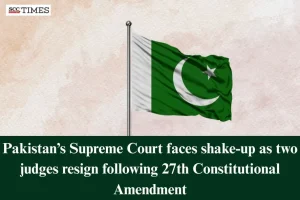On 13-11-2025, the President of Pakistan received the resignations of two sitting judges of the Supreme Court: Justice Syed Mansoor Ali Shah and Justice Athar Minallah. Their decision came just hours after the 27th Constitutional Amendment was signed into law, a measure that dramatically reshapes the country’s judicial landscape by establishing a Federal Constitutional Court (‘FCC’) and stripping the Supreme Court of its authority to adjudicate constitutional questions.
The 27th Constitutional Amendment:
Passed on 13-11-2025, the Twenty-Seventh Amendment represents one of the most far-reaching constitutional revisions in Pakistan’s history. Introduced by the federal government, it seeks to recalibrate key provisions governing judicial appointments, the command structure of the armed forces, and aspects of federal—provincial relations.
The amendment introduces sweeping changes:
-
Creation of the Federal Constitutional Court (FCC) with exclusive jurisdiction over constitutional interpretation.
-
Transfer of all pending constitutional petitions from the Supreme Court to the FCC.
-
Abolition of the Supreme Court’s suo motu powers, historically used to protect fundamental rights.
-
Increase in the minimum threshold for provincial cabinets in smaller provinces—from 11% to 13% of the assembly’s strength.
-
Amendments to Article 243, redefining the federal government’s control and command of the armed forces.
-
Revisions to judicial appointment processes, raising concerns about executive influence over the judiciary.
-
Expansion of military privileges, including lifetime immunity and formalization of the rank of Field Marshal.
Critics argue that these changes dismantle the Supreme Court’s role as the guardian of fundamental rights, concentrating power in the executive and military, and undermining the principle of judicial independence.
The Resignation:
In deeply principled statements, both judges framed their resignations as acts of constitutional fidelity rather than political dissent.
Justice Syed Mansoor Ali Shah, in his letter, described the amendment as witnessing historic scar on judiciary, he stated:
“The twenty-seventh Constitutional Amendment stands as a grave assault on the Constitution of Pakistan.
By fracturing the unity of nation’s apex court, it has crippled judicial independence…”
Invoking his constitutional calling, he added:
“I cannot protect the constitution, nor can I even judicially examine the amendment that has disfigured it.
I am unable to uphold my oath sitting inside a court that has been deprived of its Constitutional role; resignation therefore becomes the only honest and effective expression of honouring my oath.”
Justice Athar Minallah, addressing the President, wrote:
“Prior to the passage of the twenty-seventh Amendment, I wrote to the Chief Justice of Pakistan, expressing concerns over what its proposed features meant for our constitutional order…
The Constitution that I swore an oath to uphold and defend is no more.”
He cautioned that remaining in office would amount to “silent acquiescence in a constitutional wrong” and warned that future generations will judge those who remain complicit.
“May those who judge do so in Truth.”, his letter concluded.
Tendered with immediate effect, these resignations mark a constitutional crisis of unprecedented scale, underscoring the judiciary’s struggle to preserve its independence in the face of sweeping structural changes.

